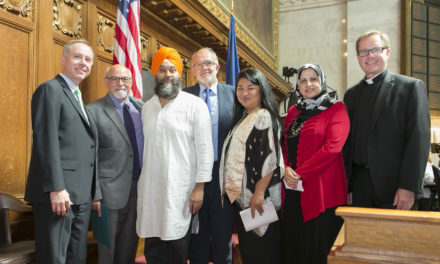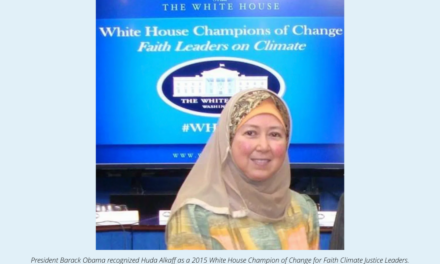
Anwar Sallumi immigrated to America in 2008 as a refugee fleeing to safety from the war in Iraq. With no extended family in the United States, Sallumi uprooted his immediate family from Baghdad to live with an American friend in Mauston, Wisconsin. Now, Sallumi lives and works in Milwaukee, Wisconsin as a data analyst for the Department of Children and Family Services.
His children are both high school graduates, with his youngest daughter, Sana Shakir, an incoming-freshman at UW-Milwaukee focusing on Biochemistry. He recognizes the importance of his prior English education and understands the opportunities that come with knowing a second language. He said English “opens wider doors for more knowledge, gives a lot of satisfaction, helps to access more job opportunities, and makes education and life easier.” Sallumi distinguishes between his children’s language experiences and his own. He said there is “no comparison” and his children’s language experience was “very natural.” Unlike Sallumi, many refugees and immigrants are not as lucky. They come to America with no English skills, no job prospects, and no resources to support a cultural transition. A number of federally funded refugee resettlement agencies provide comprehensive services to refugees fleeing from war and persecution around the globe. They provide high-quality services, including initial housing, food, clothing, school enrollment for children, assistance with job placement and importantly, English lessons. The broader Muslim community and Mosques have also provided countless volunteers, home furnishings and financial assistance to many of the refugees.
Sallumi spoke to the Wisconsin Muslim Journal about his English language experiences and how preparedness helped him and his family assimilate in America with less complications.
Q&A with Anwar Sallumi
Wisconsin Muslim Journal: What people or situations led you to learn English as a second language?
Anwar Sallumi: When I was in high school in 1980s, there was no internet, satellite channels, or social media websites. I used to spend a lot of my leisure time reading novels, most of them were translated into Arabic mainly from English. I was very interested at that time to travel to Europe, and especially to London. I had a big desire to study abroad. That is why I felt that it was important for me to learn English and get ready for my future journey. Although I had an opportunity to take French classes, I preferred to focus on English for many reasons. English is a widely spoken language in the world, and it is the official language of about 50 countries. That opens wider doors for more knowledge, gives a lot of satisfaction, helps to access more job opportunities, and makes education and life easier.
Wisconsin Muslim Journal: How has your academic study of English affected your life in the United States?
Anwar Sallumi: Coming to the United States with good English communication skills and education has made my life much easier, compared with other immigrants and refugees who have come with minimal or no English skills. Due to my good English skills, I succeeded to get a good part time temporary job as an interpreter three weeks after my arrival to the America. A couple of months later, I got a full time permanent job as a caseworker at one of the refugee agencies in Milwaukee. I helped my children during their first year at school, since they came to the United States without any English. Our life was very normal and we did not face any challenges.
Wisconsin Muslim Journal: What are some advantages and disadvantages to having learned the language in a classroom setting?
Anwar Sallumi: I would say that some of the advantages are the opportunity to get introduced to the basics of the foreign language, the classes are usually based on standard curriculum to develop skills gradually, the feeling that students should follow instructions from teachers and respect their authority, assistance and feedback from the teacher on homework and correct answers, and focus on learning important grammatical aspects of the language. On the other hand, the disadvantages are the lack of interaction with native speakers of the foreign language, textbooks and contents might be irrelevant and boring, focus on grammar in details, vocabulary is memorized out of context, focus on reading and writing skills rather than speaking the normal daily phrases and expression of the foreign language, learning incorrect pronunciation from non-native speakers, and traditional learning methodology which keeps students thinking in their native language when they want to communicate in the foreign language.
Wisconsin Muslim Journal: What is the importance of translation services in a city like Milwaukee?
Anwar Sallumi: Milwaukee has diverse populations of immigrants and refugees who speak different languages and some of them cannot communicate in English at all. Lack of communication in English complicates some daily routines like shopping, banking, schooling, housing, reading mail, and understanding important instructions. One of the big issues is providing linguistically and culturally appropriate translation especially in medical and legal settings. Some agencies and service providers rely on electronic translation applications like “google translation” in translating and disseminating some important documents or in providing some important communication and instructions. This might work in some situations, but it is very confusing and could be dangerous is some others. Confidentiality and accuracy are among big controversy issues in translation services both in Milwaukee and other areas. Some individuals may request an interpreter from a different community or prefers a phone interpretation to avoid exposing sensitive information which might be shared among the community members and families by the interpreter. It is very important to find a female interpreter in some situations which require sensitive information. A language like Arabic is the official language of more than 20 Arab countries. An Arabic interpreter from one Arab country might not be capable to deliver accurate interpretation to an individual from another Arab country due to differences in Arab dialects and some cultural and societal aspects.
Wisconsin Muslim Journal: Some people believe there is a generational gap with immigrants using a second language, so do you think there is a difference in the experience of children speaking a language native to their new country versus an adult experience?
Anwar Sallumi: Absolutely, there is a big difference. The children usually learn English at school with all relevant aspects of language and culture like accent, daily used phrases and expressions, jokes, behaviors, and other characteristics of appropriate spoken language. On the other hand, adults usually have no good opportunity to learn all these aspects of language and culture due to lack of standard schooling, lack of proper interaction with native English speakers, cultural shock, challenges of coping with the new life’s complicated systems, focusing on job and living, and inappropriate ESL classes and curriculums which require long hours every week for a couple of years.
Wisconsin Muslim Journal: Have you seen the lack of language skills create barriers for people, including work and even family?
Anwar Sallumi: Yes of course. For example, many experienced individuals with good work and education background face a lot of challenges in finding appropriate jobs due to lack of language skills. They do not have a choice other than to accept labor exhausting jobs which negatively affect their life, health, feelings, skills, ambition, and their families as well. Many parents have difficulties communicating with their children’s schools and teachers. It is hard for them to understand instructions and letters that their children bring from school which might need approval or more information. In addition, it is hard for those parents to help their children in the learning process and completing homework, especially during the first couple of years after arrival to the United States.
Wisconsin Muslim Journal: How would you compare the language experiences of your children to your own youth?
Anwar Sallumi: No comparison! My children’s language experience was very natural. They were 13 and 8 years old when we came to the United States in August 2008. Their learning process was much easier because they were in the ideal environment for learning the language and all related aspects of life, culture, and daily situations. My language learning experience during my youth was completely different. Our schools’ English curriculums were outdated, impractical, and boring. None of our English teachers were native English speaker or who studied English abroad. Most of them were lacking some fundamental skills of teaching a foreign language. Due to the 8-year Iraq – Iran war, all foreign companies left Iraq due to the fighting, and also tourists and visitors stopped coming to Iraq. There was no any opportunity for me to find a foreigner to talk with and practice English. I had to spend a lot of time and make big efforts during my language learning process.
Wisconsin Muslim Journal: Do you believe there is a benefit to learning more than one language?
Anwar Sallumi: Yes, learning more than one language has big benefit and adds more value. A bilingual or trilingual individual has more job opportunities than those who speak one language only. It is good and nice to interact with other different people and know more about their culture, history, and other life aspects.















